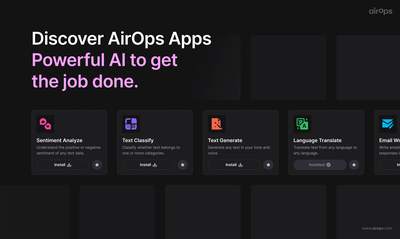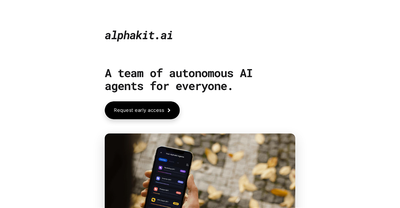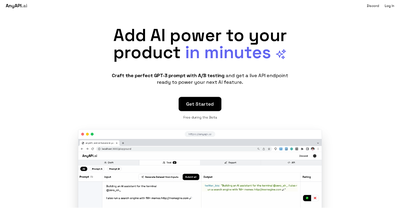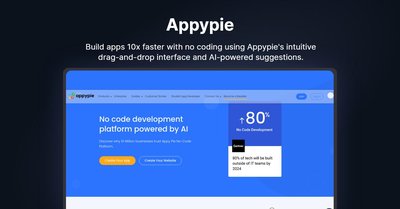Trigger.dev Realtime AI [LW24]
![Trigger.dev Realtime AI [LW24]](https://f005.backblazeb2.com/file/thejogroup/media/images/tools/trigger_dev_realtime_ai_lw24_trigger_dev.png)
Trigger.dev is a powerful tool that makes managing background jobs easy and reliable. It is great for developers who want to write code without worrying about timeouts or managing infrastructure. The platform works well with your current tech stack and offers a JavaScript and TypeScript SDK for easy setup. With Trigger.dev, you can write background jobs using normal async code and offload them to the platform. It handles queueing, replaying, and canceling tasks while providing full visibility of every run in the dashboard. One of its standout features is the ability to handle long-running tasks like video processing, audio manipulation, PDF conversion, or large CSV processing without any timeouts. This makes it ideal for AI tasks that often exceed serverless timeouts, such as waiting for LLM responses. The Realtime feature allows you to stream results directly to your frontend, providing users with a real-time experience about the status of their tasks. Tasks are inherently durable due to the checkpointing feature, which allows the state of your task to be saved and resumed later, ensuring reliability. You only pay for the time your task is actually running, thanks to the freeze during waits feature. With Trigger.dev, you can write your usual async code without splitting it into chunks to avoid serverless timeouts. The platform supports batch triggering, allowing you to initiate multiple runs of a task with custom payloads and options. For fanning-out scenarios, you can trigger multiple task instances and wait for all results before proceeding. Automatic retries ensure that if your task encounters an uncaught error, Trigger.dev will attempt to run it again. You can combine and nest tasks, with each task maintaining its own retry behavior. Advanced filtering makes it easy to sort and find tasks based on status, environment, tags, and creation date. You can filter from the dashboard and programmatically via the SDK. Bulk replaying allows you to create copies of multiple runs simultaneously, using the same payload but with the latest code version in your environment. This is particularly useful for replaying failed runs or testing updates across lots of tasks. Real-time alerts keep you updated on run failures, deployment issues, or successful deployments through your preferred notification method, such as email, Slack, or webhook. You can attach up to five tags to each run to serve as powerful identifiers, helping you filter and organize your runs through both the dashboard and SDK. Testing tasks in every environment using the test page in the Trigger.dev dashboard ensures everything is working correctly before pushing your tasks live. React integration allows you to interact with the Trigger.dev API using the React hooks package, fetching runs, batches, and subscribing to real-time updates. The schemaTask function defines a task with a runtime payload schema, validating the payload before the task is run. Atomic versioning allows you to deploy new versions of your code without affecting currently running tasks. You can add waits to your tasks to pause execution for a specified duration, useful for writing complex tasks without manual scheduling or polling for changes. Trigger.dev supports multiple environments, allowing your team to test and deploy tasks in different environments without interrupting production. Trigger.dev Realtime is now generally available with better reliability, increased limits, and a new feature that allows you to stream LLM responses directly to your frontend. Realtime allows you to subscribe to runs and receive updates in real-time, from your backend or your frontend. This bridges the gap between your long-running background tasks in Trigger.dev and your application. Realtime features include showing progress bars and toasts, streaming AI/LLM responses, monitoring multi-step task progress, and gaining insights into AI agent interactions. The Realtime API is built on top of Electric SQL, an open-source PostgreSQL syncing engine that works over HTTP. After triggering a task, you can subscribe to the run using the runs.subscribeToRun function, which returns an async iterator for real-time updates. You can also subscribe to changes to any run that includes a specific tag or tags, or subscribe to changes to any run in a batch. The Realtime API is fully type-safe, ensuring consistency from the backend to the frontend. Granular access control allows you to create Public Access Tokens with limited scopes, restricting access when using the Realtime API from your frontend. Realtime in Production Trigger.dev Realtime is already used by over 60 organizations in production, including Midday.ai, Cookbook AI, and Papermark.io, providing real-time updates to users. To get started with the Realtime API, you can check out the Realtime API documentation and the React hooks documentation. Trigger.dev Realtime is now generally available and ready for production use.






Comments
Please log in to post a comment.